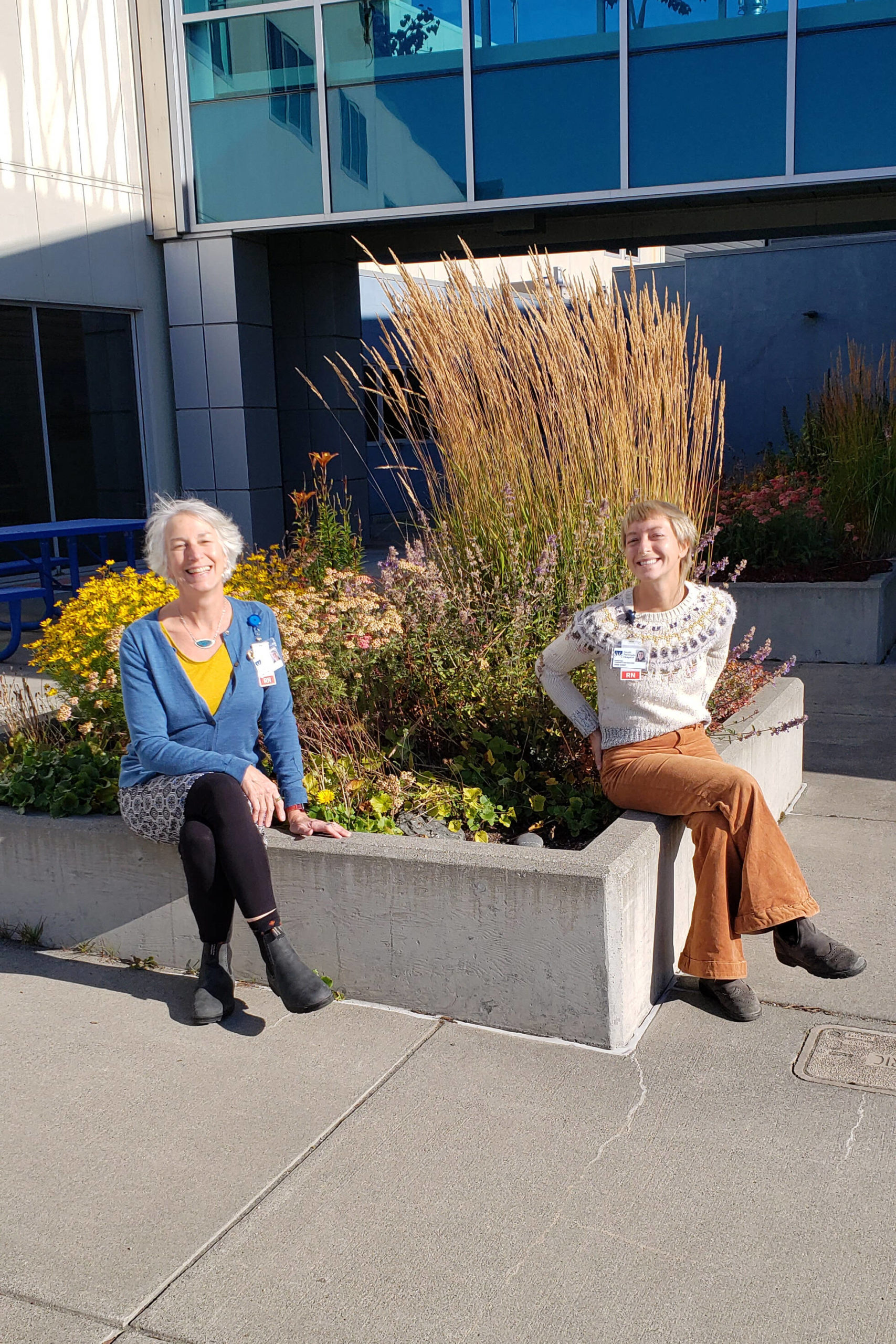South Peninsula Hospital’s new community health educator, Annie Garay, comes to her job as a COVID-19 pandemic refugee. Homer raised and educated, Garay, 31, left Alaska for college and had settled in Portland, Oregon, where she worked as a school nurse.
With her partner, in early 2020 she had started on an adventure touring North America in their Sprinter van. In March of 2020, they emerged from a Wi-Fi and cell phone dead zone at the tip of Baja California to an overload of alerts about the pandemic. Like other Alaskans caught Outside at the start of the pandemic, Garay headed home to ride it out.
“I didn’t really have an anticipation to move back here, but COVID times have a way of changing our paths,” Garay said. “COVID brought me back here, but I’m loving it.”
The daughter of Teena and Pete Garay, Annie went off to college in Oregon after graduating from Homer High School. She started at the University of Oregon in Eugene and eventually received a bachelor of science in nursing from the Oregon Health and Science University, Ashland. Working as a school nurse allowed her to return home every summer to work cleaning charter boats.
Garay said she felt drawn to medicine because “I loved connecting with people. I feel a natural, gravitational pull to healing and helping others. … I’m sure glad I did go into the field. (There’s) plenty of opportunity. It’s taken me to some cool places.”
After quarantining in her Sprinter van at the start of the pandemic, Garay got her Alaska nursing license. She soon started working as a COVID-19 contact tracer with Homer Public Health and later as a COVID-19 operations nurse with South Peninsula Hospital. Garay gave COVID-19 vaccines at mass vaccination clinics and last summer’s pop-up clinics on the Homer Spit
“I really enjoyed some of those first clinics where it was a lot of teachers coming through,” she said. “… Just seeing people I hadn’t seen in so long. It felt really special and cool to see folks coming out of the woodwork who helped raise me in the community.”
Garay takes over the job as community health educator from Bonita Banks, who has narrowed her scope to addiction medicine.
“I’m really hoping to expand beyond the lens of COVID,” Garay said. “My goal is to bring accessible health education and tools to the community, and meet the needs of the community where they are.”
One project she has already started is reviving “Health in Homer,” a monthly newsletter Banks did. People can sign up for that newsletter at https://www.sphosp.org/resources. Garay said she hopes to do things like hold presentations on things like mental health tips or how to boost the immune system. As she settles into her new role, Garay said she also is connecting and collaborating with community partners.
“As I get rolling, I’m doing a ‘windshield’ observation and getting familiar with all the resources in our community and making connections and seeing how we can work together,” she said.
Garay also said she wants to improve communications and keep people informed about public health, “finding ways we can connect as humans and Alaskans, sharing this view and those resources. I know there’s so much that can connect all of us despite our political beliefs and how we feel about the pandemic.”
Although her focus has shifted, Garay still keeps her hand in COVID-19 work. Last week when the heavy-lift vessel Falcon came into Kachemak Bay to pick up and transport the jack-up rig Randolph Yost, Garay and Public Health nurse Lorne Carroll took a pilot boat out to the Falcon to administer COVID-19 vaccines to the crew.
In a recollection she wrote about the visit, Garay said it had special meaning to her. Her father works as a marine pilot, and he had visited the Falcon earlier to help them anchor. Many of the crew were Filipino and had been at sea for eight months. Some had never gotten the COVID-19 vaccine while others got their second shot.
“For all, we were providing big smiles and gratitude,” Garay wrote.
She wrote that they set up behind the foosball table in the recreation room of the Falcon.
“I felt like the nurse version of a chef at Benihana’s, lots of eyes watching every orchestration and jab,” she wrote, “and more photos and selfies were taken than we could count.”
Garay wrote that the crew of the Falcon told her “they felt appreciation to be able to return to their families and home countries fully vaccinated.”
“I felt an incredible sense of appreciation for the connections and experiences that bridge community health to global health,” Garay wrote.
Reach Michael Armstrong at marmstrong@homernews.com.


